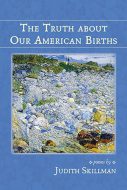 Judith Skillman
Judith Skillman
The Truth about Our American Births
Shanti Arts
Reviewer: Erica Goss
The poems in Judith Skillman’s enigmatic new collection, The Truth About Our American Births, provide clues to the shifting stories of the author’s family’s past. Bits and pieces of that elusive truth appear in various forms throughout the book: a grandmother’s eccentricities, a German river, and the stings of bees and hornets, to name a few, unlocking deeper layers of memory.
Taut and restrained, these poems tell stories in vivid fragments. “Down the Spree” (the Spree is a European river that flows from the Czech border through the center of Berlin) depicts a lurking evil in stark details: “The German countryside does not lament … / Those taken hostage / in their pajamas merely agree to board / trains and sit in straw.” In “Can’t Return,” the wind possesses an “all too human moan;” the speaker muses that she “can’t return the sturdy log / of a toddler I swaddled.”
In “Late Bees,” the speaker’s recollections of encounters with stinging insects prompt her to wonder, “What other memory burns / like a coin you lost / with your youth.” The poem turns abruptly with the ending lines: “… danger appeals most to those // bred on chaos whose parents came / to a strange country out of season / out of change.” These lines evoke the many shocks, some small and some immense, that occur to the children of the survivors of world tragedies as they find out what really happened to their parents and grandparents.
In the case of these poems, the tragedy is the Holocaust, and Skillman, like so many others, “was shielded from the past her parents shared with their fellow immigrants.” One such bearer of the past is Skillman’s grandmother, whose strange appearance and inexplicable behavior leave an indelible mark on her grandchildren. From the moment we meet her in the collection’s opening poem, “My Grandmother’s Waltz,” to her final appearance near the end of the book, this Bubba, so foreign and yet familiar, captures center stage.
“My Grandmother’s Waltz” shows us the grandmother through the eyes of her grandchildren, who believe, with the assurance of the young, that they’ve transformed her:
we had, in our infinite power
made her into a kind of a contraption—
a Babushka spinning in its own squat body …
How had we concocted this underling?
Skillman uncovers some of her grandmother’s history in “Polish Mother:”
She speaks six languages,
leans into the kitchen
where memory concocts sweet cakes …
She wore a woolen dress
to work in the office of her father
the notary, who taught her
against custom to read and write.
The lines “Some / relationship exists between / the swan and the train,” from “Blue Note,” infer a connection of the “symbolic” and the “punctual.” The poem doesn’t reveal the exact nature of this connection, but moves through an oblique narrative that includes “excesses of memory,” coming to rest on the train, which recalls “certain undertones”:
those Holocaust stories told
and later taken back,
as the most difficult facts
come to be handled by time
and distance.
In this final stanza, Skillman tells us that “time and distance” have a way of softening memory, of casting doubt and recasting narrative as stories are told and retold, as “hurt can be liquored up sometimes / but still remains a drug, watery.”
Skillman is adept at creating memorable portraits, as in “Margot Again,” a painfully accurate depiction of “a cousin I must humor”:
Wearing those clothes from the old country,
unwashed, no makeup …
Let me make you some chicken soup—
she takes over the kitchen …
We all have a cousin Margot, or know someone who does, whose presence irritates beyond all reason. Margot reminds us of what waits for us in “that town in Europe, / a village so small it doesn’t exist,” a place presumably populated with people just like her. Margot’s most disturbing quality is not what she reminds us of, however; it’s that she knows how much she affects us when she says, “What is it about you? / You don’t know how to enjoy a hearty meal?”
A couple negotiates their inhospitable yard in “Glacial Till,” a place that echoes their abrasive relationship:
Once he turned up a crop of stones
and came to her
saying they were potatoes …
Once she cut a sunflower down
in its prime
and he was blind with rage for days.
They live next to a hill, which, “as it erodes,” delivers odd and disturbing gifts: “the armor of a cyton,” “leaves of a fern,” “shells / and bird bones.” Theirs is an intimacy rooted in dysfunction, mirror images of each other: “the woman wily in her weakness, / the man stupid in his strength.”
In The Truth About Our American Births, Judith Skillman creates a survival narrative linked through revelation and image but that eschews any easy answers. A deadly power exists in the story that is not told, i.e., the Holocaust narratives edited and sanitized, those precious details the survivors can’t or don’t want to give away, which eventually die with them. In a strange way, these details are a last bit of power wielded over the children and grandchildren, those who will never know the impoverished village in Poland, or the trains taking people to their deaths. The question of what truth is, and who gets to tell it, lies at the heart of this book.

